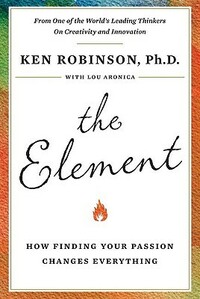You need to sign in or sign up before continuing.
Take a photo of a barcode or cover
El concepto del libro es interesante, pero creo que a mitad más o menos se pierde y termina siendo una crítica al sistema educativo post revolución industrial. Me hubiera gustado que hiciera más énfasis en la búsqueda del "elemento" que es el tema central del libro.
I thought this was brilliant. Some excellent case studies highlighting the importance of being in your element
Good sound points, but I'm not sure how helpful it is to me.
Definitely leaves me unimpressed with most school systems and the direction they're going in.
Listen to the audiobook instead of read, it's great being read by Ken Robinson, who is an awesome speaker.
Definitely leaves me unimpressed with most school systems and the direction they're going in.
Listen to the audiobook instead of read, it's great being read by Ken Robinson, who is an awesome speaker.
Ken Robinson is my new hero. He connected the economy, the environment and education reform. What all these have in common is that they need resources to survive - and the current educational system is not growing the resources in the ways that are needed. When businesses and governments are needing creativity and a more global view point, education systems rely on standardized tests and segmented curriculum. Sir Ken Robinson argues that individualizing education and allowing children to discover and develop their strengths will lead to a more holistic view of the world and transform society. These changes are greatly needed during this time of great revolution in technology and global connectivity.
The Element is a good, straight-forward read. I was hoping for something that might help me find my element, and while there were some good examples of other people finding their elements, I found the part of the book that attempts to help the reader find his or her element to be quite short. The rest of the book is filled with information on how our schools and work stifle our creativity and keep us from finding our element. While I wholeheartedly agree, I feel I've read that information in other books that are better at presenting that information.
I found the book to be very informative and good. but I've read a lot of this information elsewhere.
I found the book to be very informative and good. but I've read a lot of this information elsewhere.
A good non-fiction book that doesn't try to force you into a pocket. I liked this because it tells stories of people that followed their own passion and how that turned out.
Again- perfect for a read to start a new year.
Again- perfect for a read to start a new year.
Skeptical of Robinson's TED talk, I picked up this book and found it even more disappointing. There are some sensible ideas: too many people give up on doing things better, testing had it's downsides, kids should be taught more music and art, and similar homilies.
It's great to have such opinions, but these don't yet make an argument. Instead of offering such a substantiated argument, Robinson relies on anecdotes of his kids doing homework, or of some famous people that he talked to. No sane person should take such writings seriously, and if anything illustrates the perilous situation of our schools it is that so many people give any credence to such slapdashary.
What's most irking is just how pompous Robinson is, and how dismissive of alternative approaches, as if we didn't already have far too many people with underexamined convictions.
Again, the basic sentiments are laudable but this is an awful and pernicious book. For good reading on education, turn to Paul Tough and other similar writers. For some of the background science, Steven Pinker writes lucidly and accessibly.
It's great to have such opinions, but these don't yet make an argument. Instead of offering such a substantiated argument, Robinson relies on anecdotes of his kids doing homework, or of some famous people that he talked to. No sane person should take such writings seriously, and if anything illustrates the perilous situation of our schools it is that so many people give any credence to such slapdashary.
What's most irking is just how pompous Robinson is, and how dismissive of alternative approaches, as if we didn't already have far too many people with underexamined convictions.
Again, the basic sentiments are laudable but this is an awful and pernicious book. For good reading on education, turn to Paul Tough and other similar writers. For some of the background science, Steven Pinker writes lucidly and accessibly.
Well written and approachable book on finding the thing that is "your thing." It's more than the typical reach-for-the-stars, go-after-your-dream motivational book. Blech. While sentimental at times, this book combines the pragmatic, analytical, scientific side of what it means to not just DO, but to BE in your life's work, and how to find that thing that let's you be your fullest, most fiery self. It's sprinkled with stories of people who struggled in their journeys as varies ages and in various ways. I like this book very much.
Really poor book. It was literally 300 pages of common sense.


